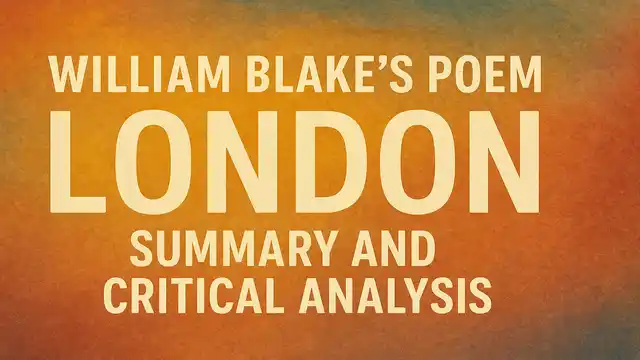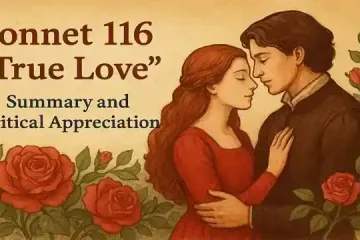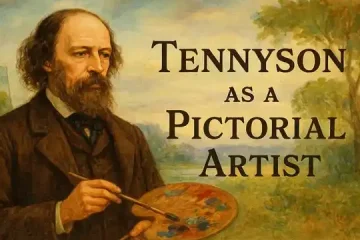Summary of the Poem:
Stanza 1:
I wander thro’ each charter’d street,
Neat where the charter’d Thames does flow,
And mark in every face I meet
Marks of weakness, marks of woe.
Explanatory Word-Meanings:
Charter’d = sanctioned and allowed or protected by law. Thames = river on the bank of which London is situated. Mark = notice. Woe = pain, torture.
Paraphrase:
The poet describes the corruption spread all over the society and nobody cares for it. It seems as if it has become the privilege of the rich and those who have some authority and power. He tells that he moves in the streets of London and wherever he goes, the situation is almost the same. The places near the Thames look quite neat but all this cleanliness and show is simply outward. Nobody is happy or peaceful within. There is the symptom of worry, anxiety and weakness on the faces of everybody. Whoever he meets reveals that he has some torture or pain in his life and thus real enthusiasm and pleasure is completely lacking.
Stanza 2:
I every cry of every Man,
In every Infant’s cry of fear,
In every voice, in every ban,
The mind – forged manacles I hear:
Explanatory Word-Meanings:
Infant = very small baby. Ban = prohibition, curse. Mind – forged = created by intellect, misuse of mind. Manacles = fetters, chain.
Paraphrase:
The poet continues to reflect on the injustice and cruelty spread all over the society. The condition does not change with place or time. Every man is crying with pain. The infants and children now do not weep for their mothers but they cry out of some unknown fear so their weeping has neither love nor any charm. A number of restrictions have been put and forced on the society. The powerful and the rich have put a number of unjust restrictions which are the product of their mischievous mind. They seem to have been chained and thus the outward show of liberty is simply a deception.
Stanza 3:
How the chimney – sweeper’s cry,
Every black’ning Church appals;
And the hapless Soldier’s sigh
Runs in blood down Palace walls.
Explanatory Word-Meanings:
Appals= terrifies. Hapless = helpless.
Paraphrase:
In this corrupt and unjust society even the women and children are equally suffering and these innocents are the victims of cruelty. The cry of the children chimney sweepers can be heard everywhere. It must create sympathy in our heart but it does not happen anywhere. The children turn back in the act of sweeping the chimney so the churches have also become black and corrupt. Instead of cleaning and purifying, they are blackening the souls which is most lamentable. Similarly the soldiers save the state but they do not get any credit for their sacrifice. They cry helplessly but the men in authority and rulers do not pay attention to them and their crying just strikes the palace walls in vain.
Stanza 4:
But most thro’ midnight streets I hear
How the youthful Harlot’s curse,
Blasts the new born Infan’t tear.
And blights with plagues the marriage hearse.
Explanatory Word-Meanings:
Harlot = prostitute. Blasts = blow up, ruin. Blights = spoil. Plague = vexation, corruption. Hearse = car, carrier for the dead body.
Paraphrase:
The poet further tells that this corruption has entered even in the family life. At midnight, the curses of the harlots can be heard echoing in the streets and disturbing the people. They are young women who have been compelled to become prostitutes by the social laws. They make the men careless even to the cries and tears of the babies because they are diverted to these prostitutes. They also disturb and spoil the joy of marriage beds. This indicates that men leave their home and run after these prostitutes and thus the sanctity of marriage is polluted. The innocence of the domestic life is made foul and corrupt by rules and regulations made by the church and court and thus they turn to sensual lust.
Critical Analysis of the Poem:
Introduction:
The change in the poetic process of Blake from innocence to Experience is very remarkable and significant. He had a strong faith that in order to reach a higher state, man must be tested by experience and suffering and this is what Blake did and achieved the maturity of thought and vision and The Songs of Experience are the result of this process. He tells that whatever we have taken for granted is not all true in life, how noble desires and innocent people are debased and perverted. They fall a victim to injustice and cruelty. It is this theme that has been expressed in the poem London also where he reveals the contraries, the hypocrisy and the real state of things. The Songs of Experience contains such poems which give a poignant contrast between perception and reality. Blake notices that a number of restrictions have been put by the rich and the powerful and they have imprisoned and killed the living spirit .
His Attitude to Sufferings:
He has frankly criticised the society, the whole trend of the contemporary civilization. His compassionate heart was outraged and wounded by the sufferings which society inflicts on its humbler and innocent members and by the ways of human material which seems indispensable to the efficient operation of rules and laws. In London, he gives his own view of life that “charter’d liberty” on which his countrymen prided themselves. He thus exposes the ugly facts of society:
I wander thro’ each charter’d street,
……………………………………..
And mark in every face I meet
Marks of weakness, marks of woe.
He is deeply sympathetic with the poor suffering people like the soldiers and the child chimney sweepers who lead their life worst than the animals. There is nobody in the society to sympathise with them, rather they are thriving on them.
Contemporary Conditions:
The child chimney sweepers, the soldier and the harlot are Blake’s types of the oppressed characteristic victims of a system based not on brotherhood but on fear. Each in his own way shows up the shams on which the society thrives. The chimney sweeper’s condemned life is supported by the churches, the soldier’s death is demanded by the court and the harlot’s calling is forced on her by the polluted marriage laws. The contrast between truth and pretence, between natural happiness and unnatural repression are stressed by Blake in these three examples and through them we see the anguish in which he faced the social questions of his time.
Lyrical Quality:
The astonishing thing about the Song of Experience is that though they were inspired by violent emotions and have a merciless satirical temper, they are in the highest degree lyrical. This fusion of irony and lyricism is remarkable in London also. It is a song of lightness and melody. The references have been taken from everyday life of common society. He refers to the infants, soldiers and harlots which quickly appear in the imagination of the readers. He has not presented any complex views on existence but his own original and realistic attitude to the state of affairs around him. Despite strong emotions, the melody has been maintained throughout. The poem possesses the elemental force that Blake puts before us for the redemption of mankind and he contrasts them favourably with the poor efforts of human intelligence.
Presentation of Corruption:
Blake does not simply represent the corruption of innocence by the immoral forces of society, but shows the inevitable distortion and sadness in the life of every man. The whole poem presents an overwhelmingly sad picture of what man has made of man. Cruelty, hypocrisy, poverty, misuse of intellect, distrust of imagination, political and ecclesiastical institutions are associated with evils which continue to corrupt and destroy the whole social system:
In every voice, in every ban,
The mind – forged manacles I hear:
Thus, the poem shows how Blake was against the material and artificial life and preferred natural and spiritual life. It is an indictment of a society that tolerates such abnormalities as chimney sweepers and harlots and of the corrupting influence of reason and its power upon life.




